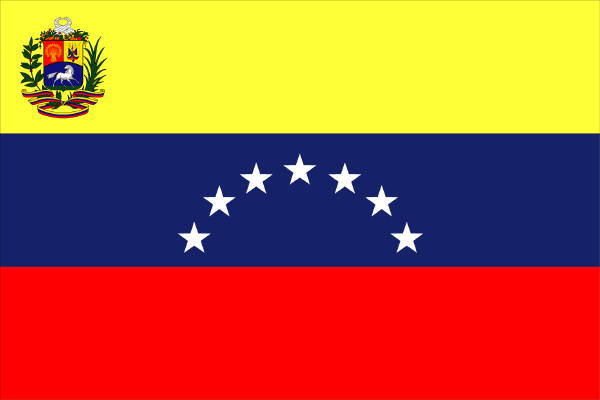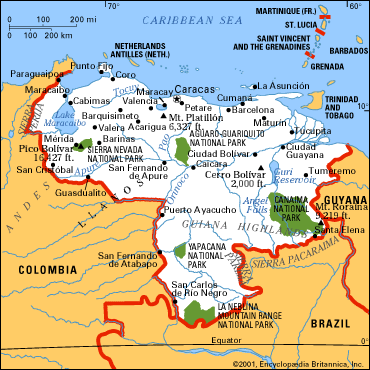|
|
|
NAME: República
Bolivariana de Venezuela
Etymology:
Alonso de Ojeda (1499) found Lake Maracaibo and called the land Venezuela
because he saw Indian houses on stilts in the water like those in Venice
(Venezia); the "-uela" ending denotes "little" or
"small" (i.e., little Venice).
POPULATION: 22,000,000 (1997); 26,100,000 (2007); 31,000,000
(2016)
ETHNIC GROUPS: Mestizo (67%); Spanish (21%); African (10%); Amerindian
(2%)
CAPITAL: Caracas (1,800,000)
Other cities: Maracaibo (1,300,000); Valencia
(910,000)
LANGUAGES: Spanish (official)
RELIGION: Roman
Catholic (96%)
LIFE EXPECTANCY: men (69); women (75)
LITERACY: 93%
GOVERNMENT: Democratic federal republic
MILITARY: 87,500
active troops
ECONOMY: Steel,
petroleum, coffee, rice, corn, gas
MONEY: Bolívar
(VEB): 470 = $1.00 USD (1997); 2,200 VEB = 1.00 USD (2007)
GEOGRAPHY: Caribbean coast; Orinoco River; Andes mountain
chain (Pico Bolívar, 16,427 feet); Sabana grasslands
INTERNET CODE: .ve
HISTORY:
13,000–7,000 BCE Human
habitation flourished in the territory of present-day Venezuela.
1498
C.E. July 31 Columbus discovers Venezuela on his third
voyage.
Columbus
thought that the Orinoco River in Venezuela proved he had found the “Earthly
Paradise.”
1521 Bartolomé de las
Casas (1474-1566) attempted and failed to found a Renaissance-style utopian
colony.
1525 Rodrigo de Bastidas
founded Santa Marta, first permanent settlement in Venezuela.
1536-1538 Gonzalo Jiménez de Quesada
(1495-1576) conquered the Chibchas, the main indigenous tribe in Venezuela.
Quesada founded Santa Fe de Bogotá, Venezuela’s
capital.
1549 The Spanish colonial
office of the Audiencia of Nueva Granada (the name for the northern region of
South America) created.
1567 Caracas
founded.
1750-1816 Francisco
de Miranda, precursor of Venezuelan independence.
1781-1865 Andrés Bello, progressive
educator, intellectual, writer, and grammarian.
1783-1830 Simón Bolívar, el Libertador of
South America, son of rich, slave-holding criollo family.
1799 Alexander von
Humboldt (1769–1759) landed in Cumaná (founded 1523) on the Venezuelan
coast; from there he undertook the most extensive trip of science and
exploration through northern South American, Mexico, Cuba, and even a visit to
see President Jefferson in Washington, D.C. He went to Caracas and then
travelled up the Orinoco River to the Río Apure, and across Venezuela’s inland
region of the Llanos.
1800 Bolívar marries niece
of the marqués de Toro in Spain (she dies 1801).
1811 Independence declared for
Gran Colombia (Nueva Granada, Venezuela, and Quito).
Bolívar
begins independence war against Spain.
1811-1812 Miranda leader of
independence army and ruler of Gran Colombia; Bolívar, thinking Miranda is
traitor, delivers him to the Spanish royalists.
1813-1824 Bolívar leads independence
army and movement.
1814-1816 Bolívar named dictator of
Gran Colombia, but he flees to Curação, Colombia, Jamaica, and Haiti from the
advancing criollo royalists and Spanish army.
1817 The rebellious Llaneros from Venezuelan hinterlands
join Bolívar.
1819 Bolívar’s battered army crosses the Andes
mountain range and he reaches Colombia.
1820 Liberal revolt
(under Spanish general Riego) in Spain against King Fernando VII of Spain helps
Bolívar recruit criollos to the independence cause.
1821 Bolívar wins
Venezuelan independence and is named president.
1825 Bolívar returns to
Caracas but is forced out by uncontrollable factionalism.
1827 Bolívar
leaves Venezuela, goes to Colombia.
1830 Venezuela is
separated from Gran Colombia.
Bolívar
dies alongside the Magdalena River in Colombia.
1854 Slavery abolished in
Venezuela.
1884-1969 Rómulo Gallegos, author, novelist, and
politician.
1909-1935 Juan Vicente Gómez dictator.
1947-1948 Rómulo Gallegos (the author)
president.
1949-1958 Military dictatorship; Marcos
Evangelista Pérez Jiménez (1914-2001)
had participated in a coup that made Rómulo Betancourt President of the
Revolutionary Government Junta in 1945. In 1948 Pérez Jiménez was involved in a
new coup, this one against Gallegos, whom the military thought was too
democratic and populist.
1952-1958 Pérez Jiménez was president
(dictator) of Venezuela. He ordered a major modernizing campaign: roads,
bridges, government buildings, public housing; he suppressed criticism
ruthlessly and he outlawed the opposition. The U.S. government awarded him the
U.S. Legion of Merit.
1974-1979 Carlos Andrés Pérez,
president: petroleum and minerals nationalized.
1984-1989 Jaime Lusinchi, president.
1989 Carlos Andrés Pérez
re-elected president.
1992 Failed coup attempt
by Gen. Hugo Chávez against President Pérez.
1993 Pérez removed from
office on corruption charges and put under house arrest at his home in Caracas.
1994 Rafael Caldera
(populist) elected president.
2002 Hugo Chávez elected
president in free elections as reaction against corruption in inequities among
other political parties.
Chávez'
policy is to implement his version of a "Bolivarian Revolution" by
ruling by decree. Chávez also calls his political plan "Twenty-first
century socialism".
2006–2013 Chávez re-elected president in
2006 and 2012.
2007 Chávez loses a
national referendum in which he proposed changing the constitution and
dramatically increasing his presidential powers including the right to seek
reelection to succeed himself.
2011-2013 Chávez dies after two year
struggle against cancer; he was operated on and received intensive treatment in
Cuba.
2013 Nicolás Madura,
Chávez’ hand-picked successor, elected president; Madura attempts to continue
Chávez’s self-styled “21st century socialist Bolivarian revolution.”
2015 (Dec. 6) The Madura
regime suffered a serious defeat in parliamentary elections, which gave the
united opposition parties (MUD: Movimiento de Unión Democrático) 67% of the
seats (112 of 167) in Venezuela’s National Assembly.
2016 Political deadlock, social unrest, and economic crisis dominate Venezuela with 141% inflation (predicted to grow to 720% by year’s end); 20% fiscal deficit of GDP; 76% of Venezuelans below poverty line; scarcity of medical supplies; food shortages.
MAJOR POLITICAL PARTIES: (16 total parties)
United
Socialist Party of Venezuela (PSUV), Nicolás Madura, leader
Democratic Unity Table (MUD: coalition
of opposition parties), Jesús “Chuo” Torrealba, leader.
Acción Democrática (social democrat
party), Henry Ramos Allup, leader, and speaker of the assembly
PODEMOS
(leftist progressive party), Didalco Antonio Bolívar Graterol
PRINCIPAL HISTORICAL MEMBERS OF INTELLIGENTSIA:
Simón Bolívar (1783–1830). Known as
"El Libertador"; Political theorist, national hero.
Rómulo Gallegos (1884–1969). Doña Bárbara (1929) (national-regionalist novel)
Arturo Uslar Pietri (1906–1992). Las lanzas
coloradas (1931), El camino de El Dorado (1948)
Mariano
Picón Salas (1901–1965),
diplomat, essayist, literary critic
Andrés Bello (1781–1865). Romantic
humanist, poet, and grammarian (Gramática de la lengua castellana)

